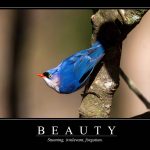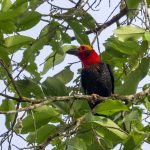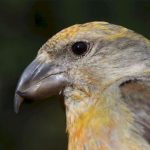Lucky bird blogger that I am, I was invited to attend a screening of Ghost Bird , a documentary film about the search for (and controversy surrounding) the alleged rediscovery of the Ivory-billed Woodpecker , which will be playing at 7 PM nightly from 28th April to 4th May at the Anthology Film Archives in New York City (2nd Ave & 2nd St) as part of their For the Birds series of films that runs until 5th May. I must say that it was a pleasure to take a long lunch break on a Wednesday afternoon (don’t worry, I made up the time) in order to view such a well-shot and simply-presented film.
photo by Damir Frkovic (Director of Photography for the film) copyright small change productions
Those who don’t know about the whole kerfluffle surrounding the announcement of the rediscovery of the Ivory-billed Woodpecker shouldn’t worry about whether or not they are prepared to see the film; the director, Scott Crocker, does a great job making sure the history and controversy are explained. Those who did follow the story to one degree or another as it played out will also enjoy the show, both for the chance to see the story retold chronologically and (relatively) objectively,* and because, odds are, at least one bit of information will be new to you.
What I particularly liked about the 86-minute film was the focus on the community and people of Brinkley, Arkansas, the town where the Ivory-billed Woodpecker search was centered. Like many small towns in the south and across the United States, Brinkley has faced more than its share of economic hardship of late, and the residents saw the search for the woodpecker as a great way to earn some money, selling everything from burgers to haircuts with the ivory-bill label. Unfortunately, the anticipated ivory-bill boom never quite panned out, leaving Brinkley in its original economic situation, summed up by one citizen as: “We’ll work for dirt and we’ve found people in other places will work for much less dirt.”
Of course, one can hardly blame the people of Brinkley for wanting to make a buck, especially when their behavior is compared to the ancient history of clear-cut logging in the area, which is described in the film, that destroyed the woodpecker’s habitat. Though bird-lovers will cringe to see Snow Geese shot, hunters are presented objectively in the film as well, with their contributions to habitat conservation lauded. And though none are located in Brinkley, scenes from scientific institutions, which have drawer after drawer of Ivory-billed Woodpecker specimens, including eggs and an actual nest cavity, are heart-rending, especially when, as was pointed out in the film, the collectors most likely had a great deal to do with the extinction of the Lord God Bird.
It is the even-handedness of the filmmakers that makes this blogger a bit disappointed when only one side is presented, like when Tom Nelson, known as the blogger behind (the now defunct) Ivory-bill Skeptic, gets to present himself as a much-put-upon blogger who was heroically trying to make sure that there was room for scientific debate about the existence of the ivory-bill. Those who visited his blog when it was still up often felt that the level of vitriol and personal attack, cloaked behind anonymity, was over-the-top, and unrelated to anything scientific (and don’t get me started on his new position as a climate-change skeptic). Was there scientific debate on Ivory-billed Skeptic? Occasionally, but it was not central to the blog.
As the film shows, information about where exactly the funding for the search and for the recovery plan for the ivory-bill would come from was sorely lacking. The Bush Administration’s Interior Department, no friend to the environment, robbed Peter to pay Paul. That is, according to several sources, money was taken from existing work with endangered species to fund the search for the ivory-bill (that specific projects that were defunded are never mentioned is chalked up to whistle-blowers’ fear of retaliation, though one must think that by now someone must be wiling to speak out publicly). It is certainly understandable why people would want to fully fund the search for an iconic species like the Lord God Bird but the idea that the money was taken from efforts to save other endangered species is disgusting. Crocker uses footage of Donald Rumsfeld and his “known knowns” comment to great effect, not exactly comparing the search for weapons of mass destruction in Iraq to the search for the Ivory-billed Woodpecker, but, really, what other reason is there for him to use footage of Rumsfeld?
Though at points, especially near the end of the film, there were touches of melodrama, overall I would highly recommend making the trek to the Anthology Film Archives and checking out Ghost Bird. It is an attractive film, well-shot with hand-held cameras and a crew of only two. The soundtrack is pretty fun as well, with some surprising picks that fit the film perfectly. Get out to the theater and support a film-maker who took the time to plumb the depths of a fascinating and heart-breaking controversy!
* I have to say that by the end of the film it was clear that the filmmaker was pessimistic about the idea that ivory-bills persist and wholeheartedly opposed to the way that Cornell handled things (that Cornell didn’t allow employees or searchers to be interviewed for the film didn’t help). Of course, the fact that Cornell has now announced an end to the search shows that the filmmakers were probably right to take such an approach.














May be worth noting (since these films tend to get confused) that I believe George Butler’s “The Lord God Bird,” another well-received independent film, is also still making the rounds in some quarters (I think), and it did BTW receive cooperation from Cornell in the making. The 3rd indie IBWO film, “Woodpecker” by Alex Karpovsky, while entertaining in its own strange way, is a HIGHLY-fictionalized account and not in the same ballpark as the two documentaries.
I emphatically disagree with your characterization of my brother’s Ivory-bill Skeptic blog. You are confusing the comments section with the blog (Tom’s words) itself. Tom had a vast amount of scientific analysis on his blog. Here’s an example of one post to illustrate:
http://tomnelson.blogspot.com/2006/02/updated-luneau-video-analysis.html
Read this post: http://tomnelson.blogspot.com/2005/09/what-does-future-hold.html and see which of his predictions came true. Keep in mind that post was written in 2005, the year of Cornell’s big announcement, when skeptics were considered by many to be crackpots and few dared to speak out.
Tom’s scientific analysis was so valued that he was thanked for his assistance by Jerome Jackson (often considered the leading authority on Ivory-bills) in one of Jackson’s papers.
I’m noticing an effort to re-characterize the whole debate. Look at the words my brother actually wrote about the alleged Ivory-bill rediscovery. They made sense then, and they make even more sense now.
@cyberthrush: Thanks for the info.
@Buck Nelson: Perhaps in the earlier years of Ivory-billed Skeptic there was more scientific value to the blog; I didn’t start following it until 2007 when, as I have already said, the vitriol overshadowed any kind of scientific debate.
Tom was skeptical from the get-go and good for him; it certainly seems like he was (and is) right.
But saying things like “few dared to speak out” is exactly what I take issue with. What, exactly, was going to happen to those who “dared to speak out?”
I can give you a quick example: I was banned from Birdforum for questioning the rediscovery: http://www.birdforum.net/showthread.php?t=40201 I wasn’t banned for breaking any rules or being impolite (read my posts for yourself,) but simply because I was speaking out as a skeptic. Skeptics were automatically branded as “trolls” and troublemakers.
Good people like David Sibley and Jerome Jackson were smeared for questioning the evidence. Both were accused of “sour grapes” because they were “unable to find the bird themselves” and Sibley of sour grapes because the Ivory-bill didn’t appear in his guidebook (so, theoretically, he didn’t want to be embarrassed by a confirmed rediscovery.) They, along with Tom, had little to gain and much to lose for speaking publicly. It’s difficult to speak truth to power, and I don’t think any organization had more power in the birding world than the Cornell Lab of Ornithology.
@Buck: I’m really not interested in a back and forth on this so I’ll say this and then leave it to you if you want a last word. The link you provided is to a huge thread loaded with people on both sides of the issue. If you say you were banned for being a skeptic, well, that sucks. But if you were banned for being a skeptic you were the only one, because plenty of skeptics were on that thread. Also, being banned from birdforum is pretty low on the list of consequences about which I would be concerned. I stand by the point I made about the way Tom’s blog was characterized in the film.
“If you were banned for being a skeptic you were the only one.” Tom was also banned for being a skeptic. I don’t know if there were others. It’s risky drawing conclusions based on strong convictions and too little evidence.
@Buck: It does seem a shame to have this useful and thioughtful review turned into a back and forth on what we (that’s both Corey and I) think your brother’s blog turned into (incidentally I don’t use BirdForum anymore since of the mods decided that they wouldn’t allow me to post about our Conservation Club as he considered 10,000 Birds ‘a commercial site’ and thus in competition with BF – and my life certainly hasn’t suffered so I’d say time to move on), but if Tom himself would like to comment let us know…
Nice review Corey. Sadly the controversy surrounding the ivory-billed woodpecker is going to last decades longer than the species itself.
Sorry to sound like a broken record, but I would say to Bill T.III (and others) that the controversy won’t necessarily go on for decades… it will be over in a flash IF definitive documentation is attained (suddenly EVERYone will be singing kumbaya together ;-)). Multiple independent searches do continue, even while the official USFW search concludes, and while many have abandoned hope, there remain many reasons others have not.
Native to the southeastern forests of the United States, the Ivory-billed Woodpecker was one of the world’s biggest woodpeckers. It is uncertain whether any Ivory-billed Woodpeckers exist today, due to destruction of their habitats and from being hunting. However, in 2004, after being presumably extinct for more than half a century, scientists reported seeing the Ivory-billed Woodpecker in a small town in Arkansas. The scientists’ announcement of the rediscovery of the Woodpecker caused other scientists, bird watchers and reporters to flock to the small town in Arkansas to catch a glimpse of the majestic bird. Ghost Bird is an insightful documentary into the relationship humans have with nature as well as the concepts of certainty and hope. The DVD can be purchased through Microcinema International website.